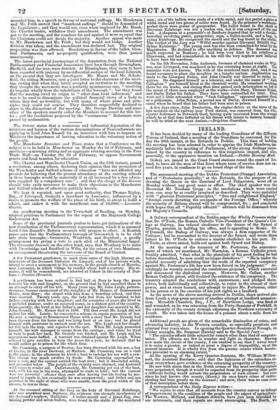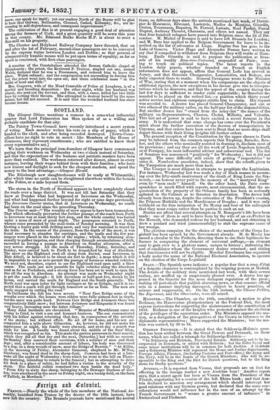IRELAND.
It has been decided by many of the leading Guardians of the different Unions of Ireland, that a meeting of the Guardians be convened for Fri- day the 30th instant, at the Rotunda in Dublin. This time of holding the meeting has been selected in order to apprise the Irish Members, im- mediately before the meeting of Parliament, of the strong feelings enter- tained by the country in reference to this iniquitous impost, and also, generally, to the oppressive taxation on Ireland.—Dublin Evening Mail.
Orders are issued to the Coast Guard stations round the coast of Ire- land, to have all the men of that force whose term of service does not ex- ceed five years, in readiness to go on board ships of the line.
The announced meeting of the Dublin Protestant (Orange) Association, and of "Protestants generally," at the Rotunda, for the purpose of ad- dressing the Queen on the dismissal of Lord Palmerston, went off on Monday without any great noise or effect. The chief speaker was the Reverend Mr. Tresham Gregg : so the resolutions which were carried nem. con. may be as readily imagined as described. They were sprinkled with "glorious Protestant principles," "free and enlightened England," "foreign courts dictating the occupants of the Foreign Office," whereby the security of Britons abroad will be compromised, &c. ; and concluded with hopes that all " Popishly affected" advisers will be dismissed from her Majesty's Councils.
A Galway correspondent of the Dublin paper the Weekly Freeman states' that Dr. O'Toole, the Roman Catholic Vice-President of the Queen's Col- lege at Galway, has refused obedience to the decree of the Synod of Thurles, persists in holding his office, and is appealing to Rome. Dr. O'Donnell, the Bishop of Galway, was always a firm supporter of the Colleges; but he succumbed to the decrees of the Synod, and wrote three letters to Dr. O'Toole to enforce a similar obedience on his part. Dr. O'Toole, as above stated, holds out against both Synod and Bishop.
At the meeting of the tenantry of Mr. Fortescue, the announce- ment of which we mentioned, Mr. Marmion, a Roman Catholic priest frankly admitted, "that what in the plenitude of his good feeling he had before discredited, he now could no longer disbelieve." "He is under the painful necessity of admitting that the truth of the reported conspiracy against Mr. Fortescue's life has now been forced on his judgment." Ac- cordingly he warmly seconded the resolutions proposed, which execrated and denounced the diabolical outrage. However, Mr. Callan, another Roman Catholic priest, still doubted the existence of the conspiracy. The tenantry adopted the resolutions with earnestness ; and pledged them- selves, both individually and collectively, to resist to the utmost of their power, and at every hazard, any attempt to injure Mr. Fortescue, either in his person or in the exercise of his just rights as a landlord. As the news of the above meeting arrived in Dublin, there arrived also from Louth a stop-press account of another attempt at landlord assassina- tion. Meredith Chambre, Esq., J.P., of Hawthorn Lodge, was fired at and wounded, as he was returning from the Petty-Sessions of Forkhill, in the extremity of the county Armagh adjoining the Northern extremity of Louth. He was taken into the house of a peasant about a mile from his residence.
Additional proofs are given of the remarkable diminution of crime, and advancing industry, in the Western counties, so especially prostrate and criminal four years since. In opening the Quarter-Sessions at Nenagb, on Friday sennight, Mr. Sergeant Hawley said to the Special Jury-
" The calendar affords little subject for remark other than that of congratu- lation. The offences are few in number and light in character. Having now made the circuit of the county, I am enabled to say that I never knew it to enjoy a greater, or indeed so great a degree of tranquillity, as at the present moment. It is wholly free from the greater crimes which hereto- fore prevailed to an alarmino_o• extent." At the opening of the Kerry Quarter-Sessions, Mr. William lif‘Den- nett, the Assistant Barrister, said that the lightness of the calendars al- most everywhere gave evidence of the returning prosperity of the country. He saw with alarm that in the North crimes of the most revolting nature were perpetrated, though it would be expected from its prosperity that quite a different feeling would actuate the perpetrators of such crimes : but ever since he had known this county, (Korry,) its once heavy crime of cattle- stealing had been greatly on the decrease ; and now, there was no case even of that description before them.
A correspondent of the Daily Express writes—
"We rejoice to state that all accounts from the country convey us tidings of improvement in the condition of the people and the aspect of agriculture. The Western, Midland, and Eastern districts, have just been travelled by our informants, and their reports are most encouraging. The North, we
knew, can speak for itself; yet our readers North of the Boyne will be glad to hear that Galway, Ballinasloe, Clonmel, Cashel, Kilkenny, &c., are in- creasing in self-dependence, and consequent improvement."
'The cultivation of flax is at present engaging a good deal of attention among the farmers of Cork, and a great quantity will be sown this year in that county. Mr. Edmund Burke Roche M.P. is about to erect a flax-mill on his property.
The Chester and Holyhead Railway Company have directed, that on and after the 1st of February, second-class passengers are to be conveyed by the express trains between London and Dublin ; so that persons of comparatively humble means will be put upon terms of equality, as far as speed is concerned, with first-class passengers.
A number of the Constabulary attended the Roman Catholic chapel at prumkeerin ; the priest, the Reverend P. Trainor, singled out one, named Walsh, declared that he was a Freemason, and ordered him to leave the place. Walsh refused; and the congregation not succeeding in forcing him out, the priest went into the open air, and there celebrated mass "in the midst of mud and filth."
Mrs. Cosgrave, wife of the Head Constable of Police at Loughrea, is of a morbid and brooding disposition : the other night, while her husband was absent, she sent out the servant, and then, with a razor, killed her two little boys by cutting their throats. She attempted to destroy herself by the same means, but did not succeed. It is said that the wretched husband has since become insane.



























 Previous page
Previous page